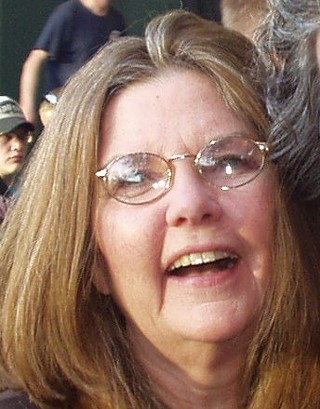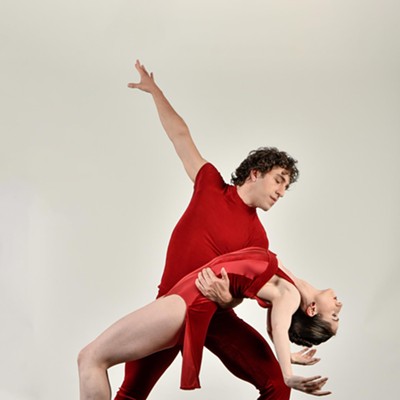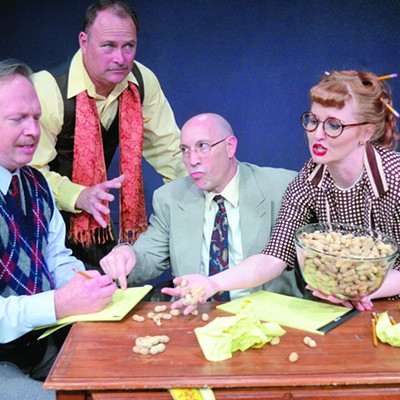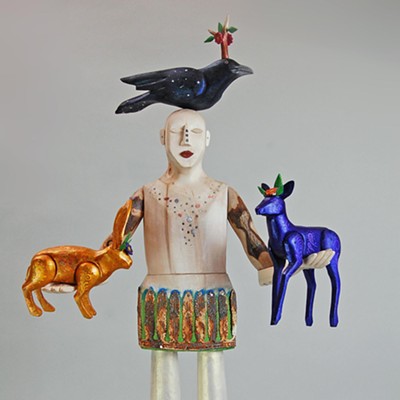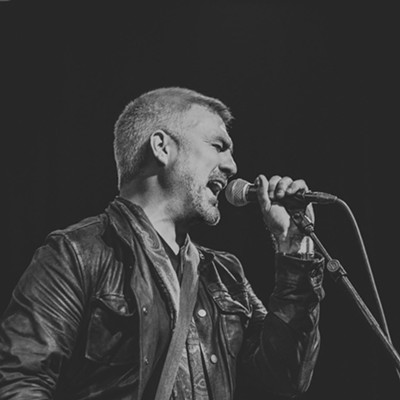"I had come to the realization in the couple of years leading up to this record that I had been living two lives," says the leonine global music entity Howe Gelb, by way of pondering how his soul has become so tender with age. He's nearing 60. "As we get older everything inside our body changes chemistry and for whatever reason, a few years ago, I started to feel, I don't know, to feel more."
He observed childhood crises with detached interest, he says, and wrote emotions into his songs mainly via inference. "Nothing would get to me so much. So I would write most of the time on hunches, stuff that was at more than arm's length away, so I wasn't affected by it."
NOW GROUNDED' NOW IN FLIGHT
But "Heartbreak Pass," released May 5, delivers lyrics from genuine pain, heartfelt happiness, even bliss, and a range of other emotions lately made real by the science of aging. Commemorating Gelb's 30-year recording career, the set reflects specifically on his impossible life traveling back and forth across the Atlantic. He thinks that he now relates as well to airline personnel as to musicians, and the travel can take a terrible toll on family life.
In Gelb's trademark word-mash fashion, the song, "Transponder" limns the loneliness of belonging everywhere and nowhere: "You're lonely as you are/no matter who you're with." Such aching images are scattered like black Easter eggs throughout these tracks. On "Hurtin' Habit": "I hurt myself/It's what I do." In "Gypsy Candle": "And the heart suffers its own beating."
Songs of grown up love bypass easy lust in favor of the mystery, "To ever have loved me true/There's something wrong with you" in "Song so Wrong," and "Life's a storm/Keeping each other warm" in "The Eye Opening."
The songs offering glimpses of his family life are simply dear, and, in "Home Sweat Home," even funny. The closing track is a simple acoustic duet with his daughter Talula. He sings "The way you come to assist/and my storm gets sun-kissed," and she responds, softly, "That's just what I do."
Recording took place in several locales, far flung and down the street. Musicians all have been members of Giant Sand for a minute or for many, many miles. Guests include John Parish, Jason Lytle, pedal steel player Maggie Björklund and the Voices of Praise Gospel Choir. Arizona musicians are pretty much three-fifths of Chicha Dust plus long-time Gelb bassist Thôger Lund and Phoenician Lonna Kelley.
The 30 years of "Heartbreak Pass" started with the 1985 release of "Valley of Rain," just rereleased as a double vinyl album with bonus material including a 1983 recording of the band at KXCI, and a full concert, including slide guitarist Rainer Ptacek performing his own material, recorded in 1986 at the Vera Club, Gronnigen, Netherlands.
THE GATHERING
Gelb was 15 when Hurricane Agnes destroyed his family's home in Wilkes Barre, Pennsylvania. He did not meet the 11-year-old Craig Schumacher, the future owner of Wavelab Recording Studio, who was among the thousands of volunteers who came to help clean up there. Gelb had gone to stay with his father and his new step-family in Tucson.
He returned to Tucson every summer while he finished high school and spent a year in art school in Pennsylvania. In art school he managed the radio station and found guitar-jamming partners that made him better. Eventually he found a mentor for recording in George Graham, a DJ at a nearby NPR station who opened his studio for three of Gelb's fledgling projects and showed him the basics of 4-track recording. "Heartbreak Pass" is dedicated to Graham.
In 1976, Gelb moved to Tucson for good and rented a house near the Helen Street Café. It was there a friend first introduced him to Tucson's legendary blues man Rainer Ptacek. Gelb knew of Rainer and had seen him play at Cushing Street Bar and other places around Town.
When the friend told Rainer that Gelb played piano, Rainer invited him to sit in. A nervous, inexperienced Gelb could not dissuade him and the duo wound up in a meandering 45-minute jam that Gelb says changed his life. That duet of musical intuition led to a brotherly bond that Gelb honors to this day.
By 1979 Rainer and Gelb had two projects, the country flavored rock Band of Blacky Ranchette, and the guitar-driven punk Giant Sandworms. The band took its name from Frank Herbert's "Dune" series of popular science fiction books.
Rainer recruited drummer Billy Sedlmayr, who was at that time in a punk band called the Pedestrians. Pedestrian bassist, Dave Seger, also joined the new project. They rehearsed in the living room of the home Rainer shared with Patti Keating.
Sedlmayr is currently experiencing a renaissance as a solo artist in the wake of his 2014 recording "Black Grenadine," produced by Gabriel Sullivan (Taraf de Tucson, Chicha Dust.) You'll find Sullivan at the 30-year mark in this story.
EL GRECO DID HAVE THAT ASTIGMATISM GOING FOR HIM
Gelb brought songs he had put together for projects he had going in Pennsylvania, when he would go back to work for his grandfather. He earned enough there to live without working in Tucson, where his rent was $70 a month, burritos were $1.25 and a pot of beans would last a week.
He learned to write, at least primitively, in every genre, and of his voice, he says, "When we first started recording with the Giant Sandworms, my vocals sounded like a horrible mash-up of David Byrne and David Bromberg. You hear how rough my stuff sounds. I think it sounds normal, and people always say you know, it's sunbaked or it's bent or it's desert rock, it's totally twisted."
Gelb says he felt he had no musical talent. He couldn't play like others did. He couldn't carry a tune. There was a problem with his eye that prevented him from reading music. "There wasn't a talent that was a natural rhythm or more a pitch," he says. "There was nothing, you know, and it's carried over to this day."
With questionable modesty, he calls it an accident that his music attracted fans. "You're like a plumber. You provide a service that some people need. Everybody can't all use the same plumber. It's blue collar rock star."
At first it was adolescent self-preservation, of sorts, that drew him to music. Later, it was a relentless drive against all odds. It would demand more time, ingenuity, management skills and gamesmanship than he ever foresaw or wanted, and lead to an emotional liability so wide you could run a freeway through it—a heartbreak pass.
SAND GOES WHERE THE WIND BLOWS
"By 1980, we were actually able to make a living only being in a band," Gelb says. "We would play out twice a month and make $200 each, and that was enough to last all month because it was so cheap to live here."
"The first recording I did in town was with all these guys from post-punk-era bands," says Gelb. "and we recorded this song called 'Curtis, John and Sue'. Then I brought in Ned Sutton to sing it. So somewhere around there's that one recording of us playing country music in 1980, but we're all from punk bands."
Sedlmayr's dad put up money for the Giant Sandworms to make an EP in 1980. Called "Will Wallow and Roam After the Ruin," it was recorded at Westwood Recording Studios, where The Pills, Amochip and Chuck Wagon and the Wheels also made records. The EP has three songs by Gelb (one is over five minutes long) and two Seger co-writes, one of those with Sedlmayr. Producers included Bill Cashman, now of Cavern Studios in Tucson; Fred Porter, now of Porter Studios in Oro Valley; and Roger King, now of RKM Productions, an events outfit.
Gelb was disappointed in how the record sounded. "I was getting restless because we had done everything you could do, here. You couldn't do a good record here. Something was weird at the studios. I don't know what it was. but when you played the recording on different stereos it always sounded different."
Rainer left Giant Sandworms because he felt it lacked focus, but by 1981 Gelb, Sedlmayr and Seger had left Tucson for the bright lights and famous rock music of New York City. Local favorites Green on Red had split for L.A., but Gelb wanted to go where the big guitar bands were hits – Patti Smith, Television, Talking Heads. They lived for a year on the fifth floor of a walk-up, where the front door wouldn't lock, drugs were on every corner and there wasn't a cab for a mile. They got jobs, had great adventures and honed their chops to the point that venerable CBGBs welcomed them from time to time.
But in that short time, the "big guitar era" had passed them by, and the sound of the future had changed to appeal to a slick and superficial new decade.
The band returned to Tucson.
NOW WHAT?
"First we all split up. We got tired of everything," Gelb says. "Ned Sutton came and got me for a summer band he was putting together in North Dakota. He's a local treasure and a great cartoonist. He was, I think, the first guy to really have a licensed record in Germany." Tucsonan George Hawke wrote all the songs for that record, as well as songs for Hoyt Axton, Jerry Jeff Walker and Commander Cody.
"In 1982, Suzie Wren, who was Danny Stuart's (Green on Red) girlfriend, put together this great collection of post-punks playing country music, including John Doe, the Long Riders, Jeffrey Lee Pierce." Wren invited the Giant Sandworms to record a track at an L.A. studio.
Gelb was dazzled by the eight-track gear and $20 an hour price. He could hardly wait to bring Rainer over to record his own music. But first, he brought The Band of Blacky Ranchette.
Gelb fell so hard for the economy, efficiency and especially the sound quality of L.A. recording studios that he moved there, eventually settling into the old Spanish architecture of the apartment building where he met John Convertino.
Giant Sandworms was, by then, abbreviated to Gelb and new bassist Scott Garber, who would later join the Silos and Alejandro Escovedo. The name accordingly was reduced to Giant Sand. Tucsonan and drummer Winston Watson was living in Los Angeles at the time, and Gelb recruited him for the first session of the first Giant Sand recording, "Valley of Rain."
Between 1985 and 1986, Gelb put out four albums: "Band of Blacky Ranchette," Rainer's "Worried Spirits" and Giant Sand's "Valley of Rain" and "Ballad of a Thin Line Man.
When Gelb met Convertino in his apartment building, the two began playing together with erstwhile member of the Go Gos Paula Brown and Chris Cacavas of Green on Red. Then Gelb leaped at an opportunity to be caretaker of some guest cottages an acquaintance owned in Rimrock at Joshua Tree. Convertino soon followed, and the pair performed and recorded as a duo. Eventually, they began to imagine finding a bassist and expanding into country and jazz sounds. Joey Burns was added a year or so later.
When Gelb moved back to Tucson, Convertino followed and not long after Burns. All three lived within a block of each other in Barrio Viejo. That lineup would define Giant Sand through the '90s, and provide a distinctive musical ambience, onstage and in the studio, for dozens of guest artists around the world.
But the '90s ultimately saw Gelb's life and music redefined by turmoil in the record industry, a protracted parting with Burns and Convertino, Rainer's death from brain cancer, and the increasing importance of trans-Atlantic travel to his career.
TRANSPONDER
By 2002, in the wake of several record label reversals, Gelb was in dire financial circumstances. For five months the whole family moved to Denmark, where the culture and family ties could provide security, and Gelb could continue his career more profitably, saving travel costs using European musicians and taking advantage of the resources European countries provide visiting artists. The arrangement became a model for the next several years.
But a windfall that same year put the Gelb clan in the black, and then some. A series of falling dominoes obliged an advertising agency to pay Gelb top dollar for using the opening of his song "Shiver" in a Diet Coke commercial. The song had been the first to break a writer's block he suffered following the 1997 death of his soul brother Rainer. It was included in the Giant Sand album "Chore of Enchantment," recorded for 1997 release by Virgin records' European imprint V2, and eventually put out in 2000 by indie Thrill Jockey. V2 had dropped Gelb but it wasn't necessarily personal; the industry as a whole was collapsing.
Gelb continued putting out about a record a year, as either a solo project or as Giant Sand, and spending half his life on the road in Europe and the U.S. He also enjoyed diversions with angels and gypsies, recording and touring with a gospel choir he met at a Canadian blues festival, then learning about and trading licks, incredibly, with the finest Spanish guitarists in Córdoba, considered to be ground zero for the unique arts of flamenco.
He had essentially left Tucson in the dustbin of the most terrible decade of his life.
COMING HOME
Then, as he told us in an interview for our September 25, 2014 cover story on Brian Lopez, "At some point around 2010 I became aware of Brian and Gabriel (Sullivan), and I realized there was a brilliant new and vibrant generation of players here ... songwriters and multi-instrumentalists all."
When Berlin's Wassermuzik 2010 Festival invited him to bring his band and three other musicians whose work represented our region, he picked Lopez, Sullivan and trumpet player Jon Villa, with whom he had worked while producing K.T. Tunstall's "Invisible Empire/Crescent Moon" at Craig Shumaker's Wavelab Studio in Tucson.
"And this ushers in the new decade for me," says Gelb, "the new realm where I come back here and I become in love with Tucson again, and see this enormous echelon of playmanship of these young people, so healthy so good.
"And eventually, I feel great about the town again."
It was Gelb who first put music writers to the task of explaining the "Tucson Sound." Arguably, there was no such thing before him. Looking back from this point in his career, he says, "In Tucson we came up with whatever sound you want to call it because we had no easy influence. We were still so remote. We took what we could get.
"That's why the original Tucson sound, to me, is something acerbic and humorous and contentious and undeniable, just like it's not going to take no for an answer, and it's going to cut through whatever, and it's going to deal with the heat, and it's not very melodic and it wasn't something you would hear when you go to a restaurant."
May Tucson musicians still be making music in that spirit 30 years from now.

